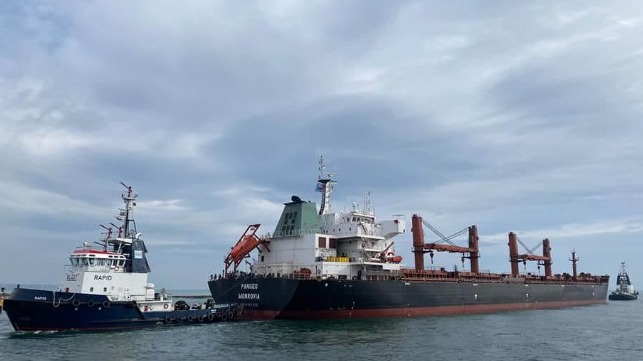Possible Mine Sighting Stops Ukrainian Grain Exports for a Day

Operations were suspended on October 26 along the humanitarian corridor for the movement of grain from Ukraine for the first time since the program began in August. UN officials with the Joint Coordination Center in Istanbul confirmed that no vessels were moving along the corridor while an investigation was underway but on Thursday, October 27 reported that vessels had again been given permission to sail along the Black Sea route.
The suspension began late on October 25 after there was a sighting of an object in the water by one of the vessels sailing the route. The officials called it a “mine-like object” seen in the northern portion of the corridor south of Odesa.
“The Joint Coordination Center authorized the dispatch from Odesa port of the tugboat Sapfir and the Search and Rescue (SAR) boat SAR-02 to perform a preliminary inspection of a possible mine-like object in the Maritime Humanitarian Corridor,” they announced in a written statement. While the investigation was ongoing, the JCC suspended the movement of ships out of Ukraine but reported that its teams cleared three outbound vessels that had already reached Turkey. The inspections of five additional outbound vessels however were suspended. In addition, two ships were cleared to sail once inbound trips were resumed, while they requested additional documentation from four other ships.
While it was the first report of a possible mine in the corridor, there have been several previous incidents with mines in recent months. At the beginning of September, a Romanian Navy minesweeper was struck and damaged by a naval mine during a mission to clear a drifting mine found approximately 25 nautical miles off the coast of Constanta. At the end of July, Romanian forces reported that they had located and neutralized another mine also found drifting along their coast.
As part of the deal brokered by the UN with the assistance of Turkey, Russia agreed to permit the transit of commercial vessels transporting grains from three Ukrainian ports. Ukraine is guiding vessels out of the ports to avoid the mines and enter into the agreed upon corridor to transit the Black Sea. In recent weeks, however, Russia has again expressed its dissatisfaction with the agreement saying that it has not been able to export its gain and fertilizer despite the terms of the deal.
“While no mine has been identified during the inspection, the JCC decided as a mitigation measure to authorize a tug boat to escort vessels tomorrow,” they reported late on October 26. Today, they are reporting that nine vessels left the Ukrainian ports of Chornomorsk, Yuzhny, and Odesa carrying a total of 117,341 metric tons of grain and other food products. In addition, eight vessels were cleared to begin the inbound voyage while the process was begun for six more vessels but requires additional documentation or was suspended for various reasons.
The program also passed an important milestone. They are now reporting that more than nine million metric tons of grain and other foodstuffs have been exported from Ukraine. A total of 399 outbound voyages have been authorized while the authorities rush to get as many vessels in and clear as much of the backlog before the program is due to expire in mid-November. At the beginning of the week, the JCC reported that 113 ships were registered for inspection, and a further 60 vessels waiting to take on cargo.

that matters most
Get the latest maritime news delivered to your inbox daily.
Speaking to reporters on October 26, UN aid chief Martin Griffiths said he is "relatively optimistic" that the agreement would be extended. He suggested there could be a review of the procedures noting that Ukraine wants to expand it to include the port of Mykolaiv. Russia continues to demand that it be permitted to ship grain and fertilizer and said that it had agreed to the original deal because it was promised that more of the grain would go to countries facing shortages and potential famine.
The JCC’s data shows that seven voyages carrying 150,800 tons of wheat have been carried out for the World Food Program. Spain, Turkey, Italy, and China are reported to be the declared destinations receiving the largest amount of the shipments, a total of 4.6 million tons or nearly half the tonnage shipped since August.
